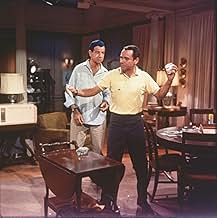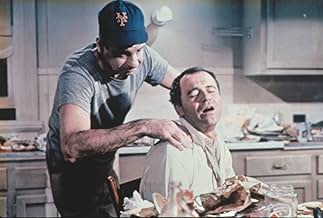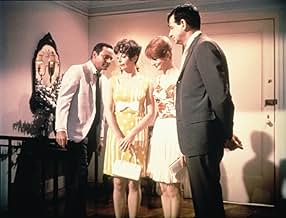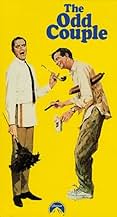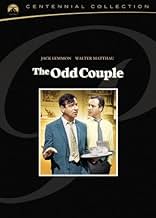Deux amis essaient de partager un appartement, mais leurs conceptions des tâches ménagères et leurs modes de vie sont diamétralement opposés.Deux amis essaient de partager un appartement, mais leurs conceptions des tâches ménagères et leurs modes de vie sont diamétralement opposés.Deux amis essaient de partager un appartement, mais leurs conceptions des tâches ménagères et leurs modes de vie sont diamétralement opposés.
- Nommé pour 2 Oscars
- 3 victoires et 9 nominations au total
- Murray
- (as Herbert Edelman)
- Matty Alou
- (non crédité)
- Sports Announcer
- (non crédité)
- Home Plate Umpire
- (non crédité)
- Hotel Clerk
- (non crédité)
- Bartender
- (non crédité)
- Chambermaid
- (non crédité)
- Bowler
- (non crédité)
- Hetwood Hale Brpun - Sports Writer
- (non crédité)
Avis à la une
Lemmon had already been in several well-known films like Mr. Roberts and The Apartment and Matthau was fresh off his Oscar win for The Fortune Cookie (another Billy Wilder film also with Lemmon). That particular movie wasn't as great as this one because the story couldn't sustain such a long running time (I think it was almost 2 hours). However, this goes by at a brisk hour and a half, even though the introduction of the events leading up to Lemmon ending up at Matthau's apartment is a tad long (so was this sentence). That's a minor quibble though and for the rest of the running time you have a marvelous time.
I have already written a comment about how the follow-up to this film sucked and I won't go deeper into that. The reason why this is such a joy is probably that the movie was made just as the innocence of American movies was beginning to fade fast into oblivion. There are some sexual references but they are dealt with in such an innocent way that you couldn't even get a "Well, I never..." out of the most prudish person out there. It is kind of fun to see a movie from a long lost era and that was probably why the sequel didn't work because you had Matthau and Lemmon say quite a few f-words and that just doesn't fit them.
Of course, now they are both gone and you can just be happy that you still can enjoy them in a marvelous film like this. I think the only male actor in this film who is still alive is John Fiedler. Edelman died recently. So there you have it. Simply one of the best comedies and films ever.
Add: I have just learned recently that John Fiedler has died so to all the fans of him I am deeply sorry. I didn't mean any disrespect and I will try to be more careful of what I am blah blah blahing next time.
And what a fine example of ensemble acting are the poker-playing buddies, even if they never seem to play. Then too, get a load of the giddy Pigeon sisters. I love it when killjoy Felix gets them out of a romantic mood with a good cry. No wonder I-need-to-touch-something-soft Oscar wants to throttle him. And I'm still wondering whether Simon came up with the name "Felix Unger" because of the loaded initials or just happened to notice them. Anyway, the initials provide a good laugh.
Of course, filming a stage play is always tricky since there're minimal scene changes. Here there're basically only two sets. But I hardly notice because director Saks manages to keep somebody moving all the time. That, plus the quality of writing and acting, keeps attention from wandering. One thing I did notice. Catch how the poker players are bunched on one side of the table so that the camera can have an unobstructed angle. It's artificial but understandable.
Anyway, this is one of my favorite comedies, and I catch re-runs of the TV series when I can. Thanks Neil Simon for a truly inspired comedic set-up.
Nicely photographed and directed. The script is very barbed -- that is, there's always more than one side to almost every line. Particularly funny scene involves 2 british sisters (Evans and Shelley) who seem amused by everything anyone says, but when Lemmon busts out his photos of kids and, yes, ex-wife-to-be, he has the girls sobbing along with him before Matthau can show up with the promised drinks!
Very entertaining.
Felix Unger (Jack Lemmon) and Oscar Madison (Walter Matthau) are friends and sharing an apartment because Felix's marriage has fallen apart and needs a place to stay temporarily. Though Felix and Oscar are friends, their lifestyles and housekeeping skills are as different as night and day, which leads inevitably to endless confrontations fueled by frustration, and the results are pure comedic splendor. The hilarious, second to none chemistry between Lemmon and Matthau is the backbone of this film, accompanied by Neil Simon's incisive, wholehearted writing gives the movie its timeless quality.
Matthau and Lemmon both do a sensational job, because even though they can't stand living together, they both do care for each other, and their performances reflect just that magnificently. If you are looking for a timeless comedy classic with brilliant writing and wonderful performances, there is no need to search any further. The film received two Academy Award Nominations for Film Editing and Adapted Screenplay.
"The Odd Couple," of course, is the story of news writer Felix Unger leaving his wife and children and moving in with his friend, sports writer Oscar Madison, who is himself a divorcée. Oscar lives in an eight-room Manhattan apartment, which he used to share with his wife and their kids. Felix is neat; Oscar is messy. Sounds pretty trite.
But the movie is a revelation. The script reveals surprising depth about love, hate, and human relationships. The Walter-Matthau-Jack-Lemmon team is like a well-oiled machine – they seem to have perfected their shtick together through several lifetimes.
Jack Lemmon plays the entire movie completely straight. He gives the exact same kind of performance as he did when he was acting in "The Days of Wine and Roses," a hyper serious film about alcoholism. When Lemmon, as Felix, is upset about his meatloaf burning, he shows as much agony as he showed in the previous film about a drunk ruining his own life. It's hysterically funny to watch this poor schmuck wrestle with his petty obsessions and compulsions, oblivious to how he affects others. Even as you laugh at him, you realize he can't help himself. Felix Unger has Asperger's.
What has changed in America, and American film, that this film from 1968 feels like a time capsule from a lost moment in America? Oscar lives in a spacious, eight-room Manhattan apartment. Manhattan real estate has become more expensive, of course. But it's more than that.
The words that kept going through my head as I was watching the movie were "grown-up" and "intelligent."
Oscar, Felix, and their poker buddies are six white guys. They meet and play poker. There are no scenes where these adult, white men are revealed to be inept in comparison to women, blacks, or homosexuals. There are no scenes where the sassy gay man instructs the straight men on how to dress or create romance. There are no scenes where the "magical negro" shows the men that they can't dance. There are no scenes where a woman puts the men down for not knowing how to take care of children or shows the men up as being blinded by lust. There are no scenes where these straight, white men are made to apologize for being straight, white men.
The men are grownups. They have jobs. They wear adult clothing. They wear white shirts and ties, slacks, belts, and shiny shoes. Oscar does wear a backwards baseball cap, but he is the clown of the group. And he does not wear it throughout the film. When he goes out, he dresses properly.
They speak of their marriages as if marriage were something important. They speak of their children as if they love them.
They go on dates. They ask women out, dress up for the occasion, and make witty banter with subtle double entendres.
While watching "The Odd Couple," I thought of recent Judd Apatow comedies starring men like Jason Segel, Paul Rudd and Jonah Hill. These current male stars all play children; they all play losers. They play failed men. The humor in these films is built around what pathetic creatures they are. In "Forgetting Sarah Marshall," Jason Segel, who is fat and prematurely saggy, is shown fully naked. The nakedness highlights his humiliation when his girlfriend, Sarah Marshall, dumps him. These films all use the F word over and over in a manner that feels desperate and limited.
There is one very sly, very funny reference to the f word in "The Odd Couple." Oscar complains to Felix Unger that he is tired of getting little notes from Felix like "We are all out of cornflakes. Signed, FU." Oscar says it took him hours to figure out what "FU" meant. A funny joke. Delivered deliciously. The only time "The Odd Couple" has to refer to the F word to get a laugh.
I've never felt, while watching a Judd Apatow comedy, that I was gaining any insight into the human condition. There are so many payoff moments of absurd comedy in "The Odd Couple," as when Oscar steps on a vacuum cleaner cord and then takes his foot off the cord at just the right moment to send Felix reeling. But there were so many moments that made me say, "Gosh, yes, that's what human relationships are like. That's what it's like to love/hate another human being."
I can't imagine a film like "The Odd Couple" being made today. A genuinely funny, intelligent, rich, grownup comedy about men that shines light on the human condition and that need never speak the F word to get a laugh. And I can't imagine anyone other than a Trump being able to afford that eight-room apartment in Manhattan.
Le saviez-vous
- AnecdotesWalter Matthau, who played Oscar in both the original Broadway play and the movie, asked the play's author, Neil Simon, if he could play Felix instead. This was because Matthau thought Oscar's personality was too similar to his own and the role would be too easy; whereas playing the persnickety Felix would be a real acting challenge. Simon replied, "Walter, go and be an actor in somebody else's play. Please be Oscar in mine." Matthau finally agreed to it.
- GaffesThe copyright date is shown as MCMXLVII (1947) instead of MCMLXVII (1967) as the copyright year for the film during the opening credits.
- Citations
Oscar Madison: I can't take it anymore, Felix, I'm cracking up. Everything you do irritates me. And when you're not here, the things I know you're gonna do when you come in irritate me. You leave me little notes on my pillow. Told you 158 times I can't stand little notes on my pillow. "We're all out of cornflakes. F.U." Took me three hours to figure out F.U. was Felix Ungar!
- Crédits fousWhen the credits for Cecily and Gwendolyn Pigeon are displayed, they are first in the wrong order (since Oscar also keeps mixing them up) and after a couple of seconds they shift to their correct positions.
- ConnexionsEdited into The Kid Stays in the Picture (2002)
- Bandes originalesRule Britannia
(1740) (uncredited)
Music by Thomas Augustine Arne
Words by James Thomson
Briefly sung a cappella by Walter Matthau
Meilleurs choix
Détails
- Date de sortie
- Pays d’origine
- Site officiel
- Langue
- Aussi connu sous le nom de
- Extraña pareja
- Lieux de tournage
- Société de production
- Voir plus de crédits d'entreprise sur IMDbPro
Box-office
- Budget
- 1 200 000 $US (estimé)
- Montant brut aux États-Unis et au Canada
- 44 527 234 $US
- Montant brut mondial
- 44 527 234 $US
Contribuer à cette page




